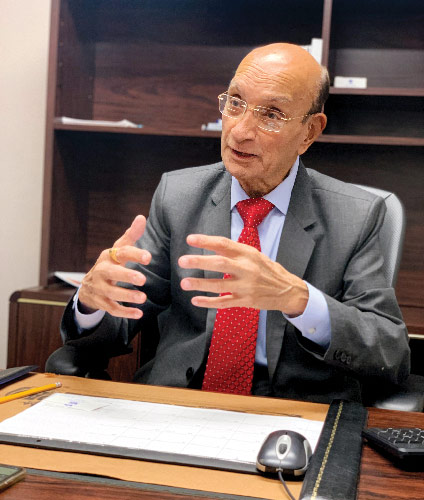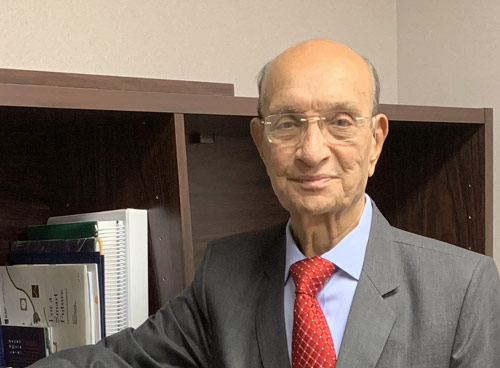A Day at the Delaware PSC
Mike Karia is a commissioner for the Delaware PSC.

The PUF team traveled to Dover, Delaware to visit the Public Service Commission, and the timing was perfect. For the PSC turned 70!
The five Commissioners are part-time, which is unusual in the regulatory world, and the Staff of about thirty, are kept busy. Some kindly took time from their hectic schedules to speak with PUF and let us know what makes Delaware special.
PUF: How did you become a Commissioner?
Commissioner Karia: About four years ago, the Governor's office called me and asked whether I would be interested in becoming a Public Service Commissioner. I said yes, I have twenty-five years of electricity generation, distribution, customer service, rate studies, and consulting experience.
I have tremendous experience in water rates because I was the Finance Director of the City of Dover. The city at the time had about seventeen thousand customers, and about forty thousand people.
Since the city is small, as the Finance Director, I would put my hand into every pie. I hired the rate consultants and worked with them on all matters. We had a committee, but I would lead the committee. I have both an MBA in accounting and an MBA in finance. I also have a law degree from India, but I have never practiced law here.
When the consultant would say something that was legally not appropriate, I would say, no. I'm going to take it out. We'd argue. That was hands-on experience, being in a small city. Now if I was the Finance Director for the City of Philadelphia, then it wouldn't be the same because then you have so many managers who handle all these things.
As soon as the opportunity came in, I saw, this is my cup of tea. Not only will I do a great job for the Governor, but I'm going to enjoy myself. I would do a great job from my heart, and my soul.
When I retired, I became a part-time MBA advisor for Wilmington University at its Dover campus. They asked me because I've been teaching in MBA Financial Management for the last twenty-five years. The Governor's Office called me and said, if I was retired, would I be a part-time Commissioner? I was looking for part-time work only.
The then Governor, Jack Markell, sent my nomination to the Senate. They had some questions for me. I got the job and then the Governor's Office told me that the office is here where I live in Dover.
The Commission's meetings are in the afternoon at one p.m. and the timing works out perfect. It fit like a glove.
While working for the City of Dover, I was very much aware of the Commissioner's job. The City of Dover has its own utilities, electric and water but it is not subject to the Public Service Commission regulation; only investor-owned utilities are. In Delaware, many cities and towns supply their own electric and some buy it wholesale. In Dover's case, it bought electricity supply wholesale from PJM through Delmarva Power & Light.
PUF: What are some big issues the Commission is dealing with?
Commissioner Karia: In terms of issues. There aren't issues but there are items. They keep coming as the time changes almost every day. One example is electric vehicle charging. Now, private companies other than utilities are coming into the arena.
Tesla and Delmarva Power & Light and other suppliers will come. Now that item comes before us and we look at the new item. These new things are a little more challenging in the sense that you have to also read information about what other states are doing.
You want to know because the issue is local. Our ways are different than New Jersey, and New Jersey is different than New York. All the states are different, but we learn from each other's experience. We've got to keep up to date with the information.
PUF: What is challenging about being a part-time Commissioner?
Commissioner Karia: I don't see any challenges for a part-time Commissioner. I believe that the Chairman should be full-time, but as a part-timer, I have never felt that the workload is too much.
We have one large electric utility as compared to other states where they might have four, five, or six electric utilities that keep coming in with new dockets.
We have two natural gas utilities. Due to the number of utilities, the workload and the concepts surrounding the workload are well managed being part-time.
The Chairman's work is quite involved. I'm doing okay being part-time in terms of work. The work does not make me pull my hair out.
PUF: How has your strong business background helped you here at the Commission?
Commissioner Karia: Since I'm a professor, I keep on going. My class is a four-hour class. All of the adult students come in, including bank managers and utility employees. They all come to earn an MBA. My class meets from five-thirty p.m. to nine-thirty p.m.
I'm basically a businessman by blood, because I come from a big business family from India. I came here forty-five years ago. When I look at it, I say, I should have done that. If I think of Facebook, I think, I should have started Facebook.
I'm constantly looking at the opportunities. At the City of Dover, as a Finance Director that's all we did. All we did was enterprising activities. Not speculating. Not putting the city's money in the stock market, but enterprising.
When I was at the City, we were building a peaking plant. We needed twenty megawatts, but then I said, wait a minute. You guys go ahead and keep talking about it. I'm going to do something else. I got some other people on the side and said, let's have a meeting.
Suppose we have forty megawatts. Suppose we have eighty megawatts. The difference of investment from twenty to forty was not much, but forty to eighty was not double. The investment was like twenty percent more, but not a hundred percent more. The excess electricity, we sold to Delmarva Power, then it went to PJM. As a city, it could not become a member of PJM. It's only for non-government utilities.
The City became a sub-member through Delmarva Power & Light. It sold electricity to Delmarva, because it thought about it and made calculations. That's enterprising within the bounds of limits of a government entity.
When these EV charging stations come in, I look at that as a new business. We are the ones responsible to customers and the people of Delaware. We want to look at what is called stop-loss order. Stop-loss order in the stock market is that you buy a stock for a hundred dollars, but you tell your broker, that when it goes to eighty dollars, sell it. I can take a twenty-dollar loss but nothing beyond that.
That's the kind of thinking I have when I look at EV charging. I say, these people are going to go and make four hundred stations. Suppose, the demand is not much for five years. All the cost of the investment will be putting forth the rate for other people. I look at the stop-loss of the dockets and new enterprising things that come before us. That goes for electric, water, and everything.
PUF: How does the Commission help keep the economy strong in Delaware?
Commissioner Karia: As you are aware, state utility commissions are quasi-judicial bodies. We have judicial responsibility, and we have judicial authority. Our main concept of looking at the rates is all the time, keep the rates lowest. Because customers benefit, people benefit - rich, poor, middle class, businesses, and non-profits.
Everyone benefits off of that. I know that the companies that come before us need to make basic income for their shareholders. If that doesn't happen, they will go out of business. Guess who's going to suffer? Our customers. Our people. Then, a new company will come, and they will bring their own things. Electricity may be interfered for two days, who knows.
It's a fine balancing act. We look at the customers, we make sure that they are happier, and the rates are affordable. There are other rate paraphernalia or concepts to help customers who cannot pay. But at the same time, the utilities make enough money to make decent dividends, or rate of return.
The economy gets stronger and stronger because this utility company employs people. Utility employment is steady. It is not up and down like so many other cyclical businesses. When other companies hit a recession, they go and lay off people. Utility demand is not like this.
I want to make sure that we continue that thinking as a stronger employer, with money-making. Money-making is not criminal. The rate of return is not criminal. It's not immoral and companies should be allowed to do that.
Companies should be financially strong to help the economy of the state. Companies should provide incentive to the new businesses. Say to the new businesses, okay, you are picking us rather than some other supplier out of state or local.
Then we will give you five percent off because you are new. Once you are on your feet, then we will put in the regular normal charges. Companies should be openly welcoming new companies, because they will equally benefit them also.
That is how I look at it and make sure that the companies come up with the new ideas to help the new businesses even though it's not their job.
Electricity is a foundation for a home, a business, and a university. Those companies should realize that they are not like some luxury industry. They're basic to life and business. I believe strongly that economy of the State is stronger due to the utilities.
PUF: What are your aspirations as a Commissioner?
Commissioner Karia: As a Commissioner, I like to practice a hundred percent balancing of decision making. Balancing includes the companies, and the rate of return, and we should happily allow that.
If the customer complains, I want to balance it. I want to say, hey, I will put all my resources to this complaint.
I'll make sure that the person has a hundred percent justice from us.
The gut instinct says, well I like this color, or I like this pen. That instinct comes from family, church, and education for each one of us. What is happening lately in the last twenty, thirty years is that technology, customers, information analysis, and information analytics are on the forefront.
The gut instinct has become limited and analytics and computers have taken over for much of data analysis. When it comes to us, we are to only use this much balancing.
Balancing is becoming easier because of the help of IT and analytics coming up and what have you. My thinking is that I keep practicing and looking at things in a balanced way. I don't want to ignore the companies and of course a hundred percent don't want to ignore the customers. That is my aspiration.
A Day at the Delaware PSC Conversations:
- Chair Dallas Winslow
- Commissioner Joann Conaway
- Commissioner Kim Drexler
- Commissioner Harold Gray
- Commissioner Mike Karia
- Raj Barua, executive director, Matt Hartigan, deputy director, Tom Walsh, deputy attorney general (assigned to PSC)
- Connie McDowell, senior regulatory policy administrator, Malika Davis and Pam Knotts, regulatory policy administrators
- Delaware PSC Celebrates 70th Anniversary!
Category (Actual):
Department:
